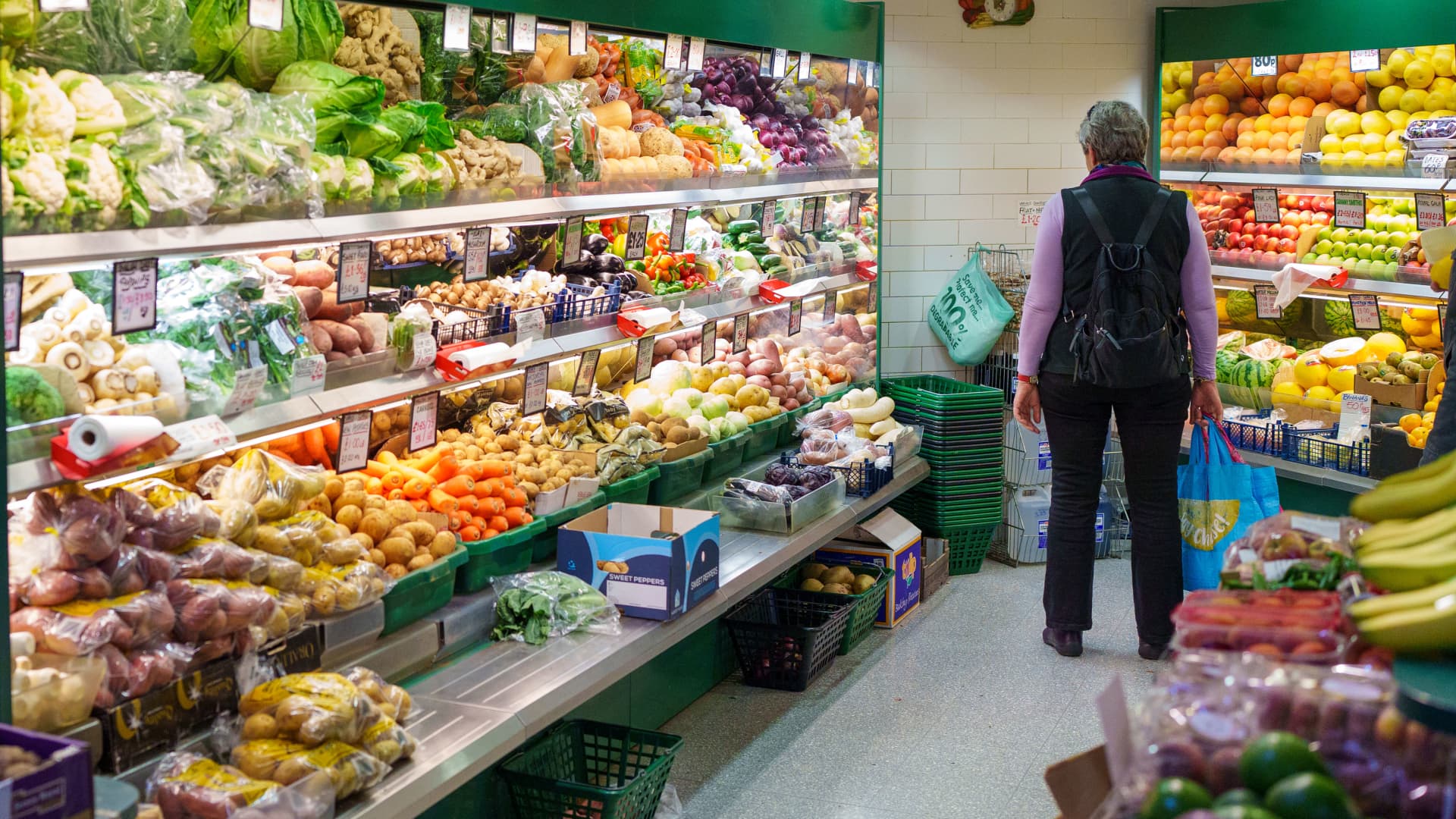At an indoor market in Sheffield, UK, a shopper is seen browsing through fruit and vegetables. The OECD recently made a prediction that the UK will have the highest inflation rate among all advanced economies this year.
Bloomberg | Bloomberg | Getty Images
The inflation rate in the UK for May exceeded expectations, with consumer prices rising by 8.7% compared to the previous year, remaining unchanged from the previous month.
Economists surveyed by Reuters had anticipated an annual consumer price index (CPI) increase of 8.4%.
On a monthly basis, the headline CPI increased by 0.7%. The core inflation rate, which excludes volatile prices of energy, food, alcohol, and tobacco, rose by 7.1% annually, up from 6.8% in April. This marks the highest rate since March 1992, according to the Office for National Statistics (ONS).
“Rising prices for air travel, recreational and cultural goods and services, and second-hand cars resulted in the largest contributions to the monthly change in both the CPIH and CPI annual rates,” stated the ONS.
The Consumer Prices Index including owner occupiers’ housing costs (CPIH), the preferred metric used by the ONS, rose by 7.9% in the twelve months leading up to May 2023, an increase from 7.8% in April.
Inflation dipped below 10% in April, but it continues to surpass consensus forecasts and remains significantly higher than the Bank of England’s target of 2%.
The Bank of England is expected to announce its next monetary policy decision on Thursday. With the challenge of curbing inflation without triggering a mortgage crisis and recession, it is widely predicted that the bank will implement its 13th consecutive interest rate hike.
Sticky inflation and a tight labor market have caused economists to revise their forecasts for peak interest rates in recent weeks. The cycle of tightening monetary policy is now anticipated to be longer than previously expected.
In early June, the Organization for Economic Cooperation and Development (OECD) projected that the UK would experience an annual headline inflation rate of 6.9% this year, the highest level among all advanced economies.
The persistence of the country’s high cost of living, with the UK having the highest CPI among G7 countries, poses a challenge for the government. Ahead of the general election in 2024, Prime Minister Rishi Sunak vowed to halve inflation by the end of this year.
Finance Minister Jeremy Hunt stated, “We are aware of the impact high inflation has on families and businesses across the country. Our plan to halve the rate this year is the most effective way to control costs and interest rates. We are committed to supporting the Bank of England’s efforts to combat inflation, while also providing targeted assistance to help manage the cost of living.”
‘A bitter pill to swallow’
According to Marcus Brookes, chief investment officer at Quilter Investors, Wednesday’s inflation report will be a challenging reality for consumers, investors, and the government to accept.
He stated, “The UK seems to be facing a unique set of circumstances, leaving the Bank of England with little choice, despite the consensus that this inflation is driven more by supply issues than demand. While the UK consumer has been resilient during the cost of living crisis thus far, signs of strain are beginning to appear. The looming shock of rising mortgage rates, combined with households already feeling the impact of increased interest rates, is cause for concern.”
Brookes suggested that further increases in interest rates, which have already climbed from 0.1% to 4.5% in the past 18 months, will intensify fears of a mortgage crisis. However, he believes that the Bank of England will feel compelled to continue raising rates, particularly with core inflation on the rise once again.
Suren Thiru, economics director at ICAEW, commented that the higher-than-expected inflation rate in May indicates that the battle against inflation is far from over. He specifically pointed out the soaring prices of food and non-alcoholic beverages, which increased by 18.4% YoY in May, although slightly lower than April’s 19.1%. Thiru mentioned that the UK’s inflation trajectory for the summer is already determined, with lower gas and electricity bills from July expected to result in notable decreases in the headline rate. He added, “While core inflation remains problematic, the squeeze on consumer spending due to skyrocketing mortgage costs and higher taxes should soon lead to its decline.”
Denial of responsibility! VigourTimes is an automatic aggregator of Global media. In each content, the hyperlink to the primary source is specified. All trademarks belong to their rightful owners, and all materials to their authors. For any complaint, please reach us at – [email protected]. We will take necessary action within 24 hours.


